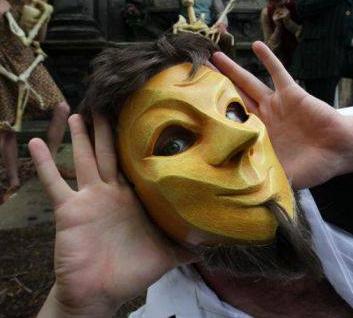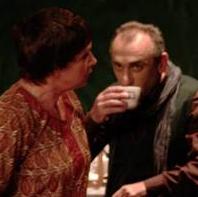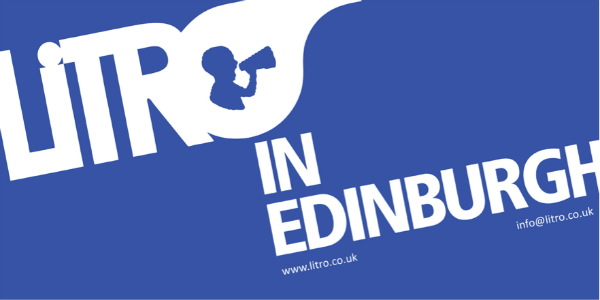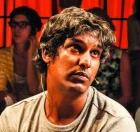You have no items in your cart. Want to get some nice things?
Go shopping
Attending book festivals I often wonder about the puzzle-work that goes on behind a neatly arranged stage-panel. Who ended up talking to whom, about what exactly, and how happy is she or he about spending an hour with this author, whose writing they might or might not like? This year’s Edinburgh International Book Festival invited four authors to each curate a series of events, choosing who should join them on the stage, as well as the theme of discussion. One of them was Canadian novelist, poet and overall visionary Margaret Atwood, here to promote her latest novel, Maddaddam. Having dedicated a dissertation and more than one essay to her work during my university years, I jumped at the chance to see what would happen when Atwood the interviewee became Atwood the interviewer. Perhaps unsurprisingly for those familiar with her work, these events offered plenty of monsters and impending catastrophes, but also a no-nonsense approach to vague answers, and quite a few additions to my reading list. “I’ve curated these events,” Atwood said on the Sunday afternoon, in the Baille Gifford Theatre. “Consider yourselves curated.”
The first event, “Writing under the Influence”, brought British novelist Naomi Alderman together with American author Valerie Martin. Atwood has made a guest appearance on Alderman’s innovative Zombies, Run! an app adventure which combines survival skills with outdoor fitness. Martin’s new novel explores the links between the spiritualist life of Arthur Conan Doyle and the Mary Celeste, a legendary ghost ship. The conversation between them strolled from specters and half-humans to zombies as the “lumpen proletariat”, speculating about why the vampire has become a sexy youth, “glimmering in the sun” instead of melting in it. Fishing for the common threads, Atwood asked her interviewees when they first started reading Edgar Allan Poe. Alderman, it turned out, had his stories read to her by her parents at the age of nine. “What peculiar parents,” Atwood remarked, notably delighted, and like so often the audience exploded in laughter. “There probably are not any monsters, zombies or centaurs,” she continued. “So they must be metaphors. What are they metaphors for?”
No nonsense. It was clear that we were in the hands of someone whose work deals with the most contemporary of anxieties: pollution, corporate greed, biological engineering, or as she’s said in essays: the what if’s of our age. The replies she received were equally candid. It is to do with fears, said Alderman – what we can’t quite put our finger on. As someone who was given Poe to read at the age of nine, she should know.
On the following Monday morning, with my expectations heightened by yesterday’s treat, I went to “Horror and Weirdness: a Scottish Peculiarity”. Atwood and Valerie Martin were this time joined by crime writer Ian Rankin to discuss what it is about Scotland that inspires such an impressive list of dark tales. After exactly an hour, (Atwood is punctual: “This is the witch hour, at which we shall all leave our human forms and go back to being writers.”) I emerged with a list of anecdotes to explore, books I regret not having read yet, and feeling strangely proud of my decision to move to this wondrous city two years ago. I had no idea that David Hume once got stuck in the Nor Loch – Edinburgh’s famous mid-town sewer – or that Muriel Spark’s husband shot her in the foot. Then there was the second sight: “Some of us believe you have it,” said Valerie Martin smugly, turning to Atwood. This, of course, lead to more talk about witch-burning, writing about ghosts without believing in them, and of course: Edgar Allan Poe.
A few hours later the queue once again snaked its tail all the way around the festival square. It was time to zip up this bookish month with not only one, but two of this year’s Guest Selectors: “Neil Gaiman and Margaret Atwood: storytellers go head to head”. “I don’t think there is a chair for this event”, I said to my friend while entering the Baille Gifford Theatre. “I think maybe they are too good at chairing themselves,” she replied. The conversation began with reminiscence. Both authors praised the importance of comics in their youths, and of libraries. They asked each other what made them want to learn to read as children, and it turned out to be the same thing: because adults never read for long enough. As an encounter between two writers on equal footing, the dynamics of this event turned out to be the most interesting and difficult. Afterwards, the slightly critical comments could be heard all around: “He did take over, didn’t he?”, “She was the one asking questions, while he went on about himself!” What did it mean, then, to select, and curate?
Maybe it meant to ask the right questions. Being a great author doesn’t make you a good chair or interviewer, but neither should one underestimate the effect of spontaneous talk, and shared curiosity. Affinity, even. Here were two magnificent writers each doing this in their own way. Atwood never allows for an evasive answer, much like her writing seldom does, and every now and then a comment made the audience laugh out loud, while she discretely giggled behind a covered mouth. Gaiman tells stories, encourages creativity and inspires courage in art. All the while, an interest in that which “looks human but is not quite human”, seemed to bring them together: the almost pathological need of opening doors you are told to stay away from. Having attended the previous two events, I smiled when Atwood finally mentioned how the librarians of her childhood had placed Edgar Allan Poe’s work in the children’s library. “Did you read Poe?” she asked Gaiman. And it turns out he did. It turns out it was the right question.

About Jessica Johannesson Gaitán
Jessica Johannesson Gaitán's short fiction and poems have appeared in publications such as The Stinging Fly, Gutter, Structo and The Scotsman. One of her stories was a winner in the Glimmer Train Open Fiction contest in the autumn of 2016. Originally from Sweden and Colombia, she arrived in Bath via Edinburgh, where she works as a bookseller and podcast editor. She is one half of @therookbookery




